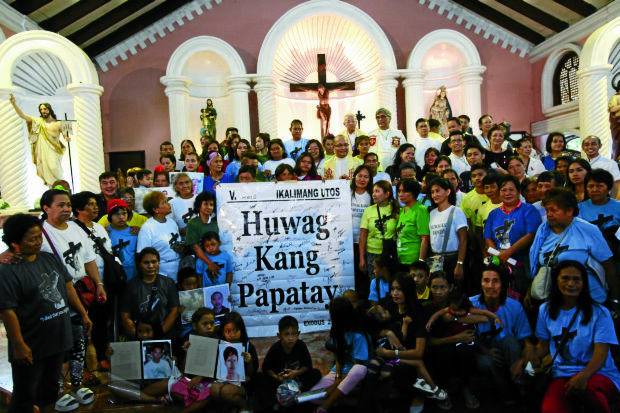Kin of police victims share tales of woe

SOLIDARITY MASS Relatives of victims of killings in the antidrug war condole with each other during a Mass held at the Our Lady of Victory Chapel in Malabon City. —NIÑO JESUS ORBETA
“The policemen were asking for P50,000 for the release of my son from jail,” a grieving mother told the Inquirer on Thursday.
Elena Dechavez said she could raise only P7,000, to which she added P3,500 that her son, Alvin Ronald, had when he was arrested in Navotas City on drug charges a few months ago.
“I gave them the money but they still killed my son,” said Dechavez, who openly wept at a gathering called “Holy Eucharistic Mass Action Against Extrajudicial Killings,” held at Our Lady of Victory Chapel in Potrero village in Malabon City.
Dechavez said she went to the police station to complain about what happened to her son. She said the cops just returned the money to her.
‘War on the poor’
Article continues after this advertisementDechavez spoke to the Inquirer a day after London-based Amnesty International released its report on its investigation of the extrajudicial killings in President Rodrigo Duterte’s war on drugs, accusing the Philippine National Police of paying officers and assassins to kill alleged drug offenders, planting evidence and setting up a racket with funeral homes in a “murderous war on the poor.”
Article continues after this advertisementMore than 7,000 suspects have been killed by police and unknown assailants since Mr. Duterte launched the crackdown seven months ago.
Amnesty warned that the killings could constitute crimes against humanity and urged the Duterte administration to investigate the murders and punish the policemen involved.
The PNP denied the allegations and Justice Secretary Vitaliano Aguirre II brushed aside Amnesty’s findings, saying criminals were not human.
She lost 2 sons
Another mother from Navotas, Maria Mesa de Parine, told the Inquirer that she lost two sons—Aljun and Danilo—four days apart—in Mr. Duterte’s war on drugs.
Rolando Paredes of Caloocan City told the Inquirer that his son, Rolando Jr., a scavenger who had no means or reason to use drugs, was killed two weeks ago by still unidentified gunmen in Tondo, Manila, in a case of “mistaken identity.”
The gunmen’s real target, he said, was a certain Reynaldo Gutierrez, the name given by police to the funeral parlor where the body of his son was taken.
The three parents joined more than 200 relatives of 70 victims of extrajudicial killings from Malabon, Navotas, Payatas and Bagong Silangan in Quezon City, and Bagong Silang in Caloocan, at the gathering, which began with a Mass concelebrated by Caloocan Bishop Deogracias Iñiguez and 15 priests.
Church initiative
The Mass marks the first time the Catholic Church has gathered a big number of families of victims to publicly condemn the extrajudicial killings in Mr. Duterte’s war on drugs.
“There was a previous initiative by Father Nonong (Fajardo) in Adamson University,” said Fr. Joselito Sarabia, director of St. Vincent Seminary in Tandang Sora, Quezon City, and one of the organizers of Thursday’s event in Malabon.
“We are continuing that initiative, with the help of friends, benefactors and other lay people here and in other countries like France, the US, and Papua New Guinea,” he said.
Fajardo, director of the extension program of Adamson University, said the initiative began in July last year, “when the number of deaths was about 1,000. We had Mass for the victims.”
Reaffirmation of support
He said the Church continued condoling with the families of the victims, and then schools started issuing statements condemning the killings, followed by more Masses and photos of the killings exhibited on the premises of the Redemptorist Church in Baclaran, Parañaque City.
The gathering in Malabon on Thursday was for reaffirmation of support for the families of the victims, Fajardo said.
“When these families meet here, they talk to each other and their fears are somehow alleviated. They also feel that the community cares for them and their situation,” he said.
Those who had been killed left behind children, “like this 5-year-old kid,” Fajardo said, pointing to a child at the gathering. “Who will send him to school and look after his needs? So if, say, five men with their own families are killed, at least five or more children will suffer.”
The gatherings move the community to pitch in to raise money to support the children, he said.
Fajardo reiterated the need for the Church and the community to unite and help each other, and allow the families to narrate their experiences and voice out their fears during the gatherings.
Families threatened
He said the perpetrators, after killing the victims, warned the families not to say a word or they, too, would be killed.
“There were times when these perpetrators, despite wearing [balaclavas], were recognized by the victims’ families,” Fajardo said.
“I’m glad that the families are now finally coming out to speak,” he added.
Many of the families are under the care of the Vincentian congregation.
“It had to take the murder of a Korean for this drug war to stop,” Fajardo said, referring to the kidnapping for ransom and murder of South Korean businessman Jee Ick-joo by policemen inside PNP headquarters in Camp Crame, Quezon City, on Oct. 18 last year.
“But the 7,000 Filipinos killed seemed to be ignored because they were all poor. Now the [military] is being asked to police the police. If they clash, what would happen next?” he said.